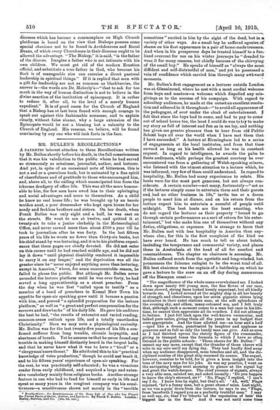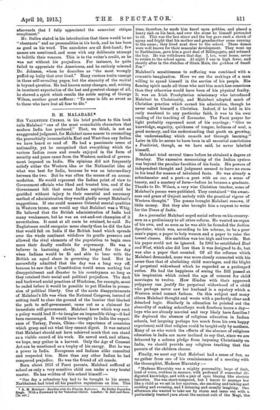MR. BULLER'S RECOLLECTIONS.* A PATHETIC interest attaches to these Recollections
written by Mr. Bullen shortly before his death, in the full consciousness that it was his valediction to the public whom he had served so strenuously as :Magmas, journalist, author, and lecturer. And yet, in spite of an occasional note of bitterness, this is not a sad or a querulous book, but is animated by a fine spirit of cheerfulness and of gratitude to those who encouraged him, and, above all, to the calling which emancipated him from the irksome drudgery of office life. This was all the more honour- able to him, for few men have owed less to their upbringing and social advantages and more to themselves. As a child he knew no real home life ; he was brought up by an heroic Maiden aunt, a poor dressmaker who kept open house for her needy and feckless brothel% and sisters. On her death, when Frank Bullen was only eight and a half, be was cast on the streets. He went to sea at twelve, and quitted it at twenty.six to take a 'junior clerkship in the Meteorological Office, and never earned more than about 2100 a year till he took to journalism after he was forty. In the last fifteen years of his life he wrote no fewer than thirty-six books, but his chief stand-by was lecturing, and it is to his platform experi- ences that these pages are chiefly devoted. He did not enter on this career until he had reached middle age, and he did not lay it down "until physical disability rendered it impossible to carry it on any longer," and the deprivation was all the greater since he" never enjoyed anything more than lecturing, except in America," where, for some unaccountable reason, he failed to please the public. But although Mr. Bonen never ascended the lecture platform until he was over forty, he had served a long apprenticeship as a street preacher. From the day when he was first "called upon to testify" as a member of a band of preachers in Kensal New Town his appetite for open-air speaking grew until it became a passion with him, and proved "a splendid preparation for the lecture platform," as well as "a great and perfect compensation for the sorrows and drawbacks" of his daily life. He gave his auditors the best he had, "the results of extensive and varied reading, common-sense outlook upon life, and a totally unorthodox Christianity." Here we may note a physiological curiosity. Mr. Bullen was for the last twenty-five years of his life a con- firmed sufferer from lung trouble, chronic laryngitis, and shortness of breath. Yet be assures us that he never found any trouble in making himself distinctly heard in the largest halls, and that he never knew what it was to have a "tired" or a " clergyman's sore throat." Re attributed this to his" practical knowledge of voice production," though he could not teach it, and to his fifteen years' experience of open-air speaking. For the rest, he was practically self-educated ; he was a voracious reader from early childhood, and acquired a large and exten- sive vocabulary mainly from religious books. Another strange feature in one who had to fend for himself so early in life and spent so many years in the roughest company was his sensi. tiveness—a sensitiveness shown not 'merely in the "terrible • Recollections: is. Relninieeonces of the rausy 70:1111.o.haL,Ployed the Parisi Porto of Author, and Lft:tt or, Hy &Oa/. &mice. wort CO.. CIO. ehl• hht-] sensations" excited in him by the sight of the dead, but in a variety of other ways. As a small boy he suffered agoniea of shame on his first appearance in a pair of home-made trousers. And when in his prosperous days he treated himself to a fur:- lined overcoat for use on his winter journeys he "dreaded to. wear, it for many reasons, but chiefly because of the chivvying' of the small boy." He speaks of himself as "always the most diffident and self-distrostful of men," and yet be possessed a vein of confidence which carried him through many awkward moments.
Mr. Bullen's first engagement as a lecturer outside London, was at.Glenalmond, where he met with a most cordial welcome from boys and masters—a welcome which dispelled any mis- givings as to the success of his campaign. 'With regard to. schoolboy audiences, he made at the outset an excellent resolu- tion and adhered to it throughout—" to avoid all appearance of the pedagogue, of swot under the cloak of entertainment. felt that since the boys had to come, and had to pay to come' out of school hours too, the least I could do was to try to make my story as full of interest and fun as in me lay, and nothing has given me greater pleasure than to hear from old Public School boys all over the world when I have met them that I have succeeded." A lecture at Birmingham led to a series. of engagements at the local institutes, and from that time onward as long as his health allowed he was in constant request. In regard to intelligence, he awards the palm to. Soots audiences, while perhaps the greatest courtesy he ever encountered was from a gathering of Welsh-speaking miners, who listened with the utmost attention to a lecture which, he was informed, very few of them could understand. In regard to. hospitality, Mr. Bullen had many experiences to relate. Hie hosts were for the-most part generous, but not always con- siderate. A certain number—not many, fortunately—" act as. if the lecturer simply came to entertain them and their guestis and_had no other business in life," invite ten or a dozen people to meet him at dinner, and on his return from the lecture expect him to entertain a roomful of people until midnight. The best hosts are the least exacting, who. do not regard the lecturer as their property " bound to go. through certain performances as a sort of return for his enter- tainment," but who make him one of themselves without any duties, obligations, or expenses. It is strange to learn that Mr. Bullen met with less hospitality in America than any- where else; for this is the first complaint of the kind we have ever heard. He has much to tell us about hotels, including the temperance and commercial variety, and places those in Australasia at the head of all for comfort and reasonableness. The chapter on chairmen is amusing. Mr. Millen suffered much from the egotistic and long-winded, but pronounces the fulsome eulogist to be the worst trial of all. Hia beat chairman was the captain of a battleship on which he gave a lecture to the crew on an off day during manceuvres. of the Biscayan coast:— " The magnificence of the whole scene overwhelmed me. fleshed down upon nearly 8110 young men, the fine flower of our race, whose shrewd, strong faces looked keenly expectant, but all kindly towards me. I looked around at the mighty ship in all her beauty of strength and cleanliness, upon her seven gigantic sisters lying motionless in their exact stations near, at the soft splendours of the evening sky, and silken, 'many-coloured sea, and I felt truly that, although such a moment comes to a man but once in his life- time, he cannot then appreciate all its wonders. I did not attempt to lecture. I just fell back upon the well-known vernacular, and talked pure sailor, giving them all the yarns in my budget that were appropriate. And the time allotted me—an hour and a half —sped like a dream, punctuated by laughter and applause as generous and as full as only the handy man can give. And as soon as I had finished uprose the stately figure of the commander, giving in trumpet tones the formula to which I have so often listened in the public schools 'Three cheers for Mr. Bullen !' I cannot say any more, except that the thunder of those cheers will echo in my ears until my dying day. They had hardly died away when my audience disappeared, mess benches and all, and the dis- ciplined routine of the great ship resumed its course. The sequel, however, remains to be told, for it gives a keen insight into the tone of at, navy man for his joke. As was my practice, I went on the navigating bridge next morning to glance at the signal log' and greet the watch-keeper. The chief yeoman of signals, alwayh a very able man, saluted me, and asked casually 'Do you happen to know the ship's steward, sir ?' 'No, Flags,' I replied, 'I can't say I do. I know him by sight, but that's all'Alt, well,' Flags rejoined, 'he's a funny man, but a great chum o' mine. Last night, as we was a-goin' down from the lecture, he says to me, "Flags, from 'enceforth I regard you as a perfectly truthful man." I may as well say, sir, that I've 'itherto 'ad the reputation of bets' the biggest liar in the fleet.' And it was not until some time
afterwards that I fatly appreciated the somewhat oblique compliment."
Mr. Millen stated in his introduction that there would be no "chestnuts" and no personalities in his book, and he has been as good as his word. The anecdotes are all first-hand; few names are mentioned, and none With any deliberate attempt to belittle their wearers. This is to the writer's credit, as he was not without his prejudices. For instance, he quite failed to appreciate the Americana and he entirely misread Dr. Johnson, whom he describes as "the most wrongly puffed-up bully that ever lived." Many curious traits emerge in these selfrevealing pages, but the sincerity of the recital is beyond question. He had known many changes, and, writing in imminent expectation of the last and greatest change of all, he showed a spirit which recalls the noble sayiug of George Wilson, another great sufferer : "To none is life so sweet as to those who have lost all fear to die."







































 Previous page
Previous page